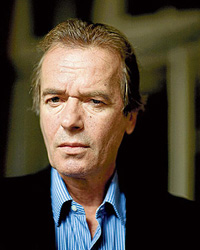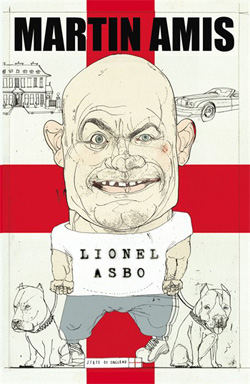You have no items in your cart. Want to get some nice things?
Go shopping
Martin Amis cut a composed, thoughtful figure as he sat above the gathered masses at London’s Bloomsbury Theatre last Tuesday. He was there to talk about, and defend, his latest novel—the provocatively titled Lionel Asbo: State of England.
Early reviews of his latest have been mostly poor, criticising the author for being out of touch with the nation he claims to dissect, or for being too strange, too Amis, to really get to the bottom of it all. But this, Amis claimed, is a misreading of a novel. Lionel Asbo wasn’t intended to be a sociopolitical commentary; it is, in fact, “poking fun at these ‘State of England’ novels.”
Lionel Asbo centres around a British thug who pronounces his own name “Loyonoo”, who wins £140 million on the lottery from prison and becomes a sort of tabloid celebrity overnight. He has a mixed-race nephew, Des, who is the opposite of him—gentle, industrious and smart—but who is having an affair with his 39-year-old grandmother, Lionel’s mother. This fascination with absurd and trivial connections, plastered together as somehow meaningful for the entire nation, is exactly what Amis claims to be joking about.
“England was pauperised by World War II,” he explained. “And even during the war, an enormous demotion awaited us. How do you respond to that? Well, we became ashamed of Empire and increasingly interested in things that don’t matter at all.” His new novel, he went on to say, is a reaction to an England “refracted through the media, a country with an obsession with the trivial.”
 Amis then read from two sections of Lionel Asbo. One concerned a crescendo of “mutts” howling “fug-off” to each other, illuminating his fictional “Diston” in London, a place populated by “foul-mouthed pitbulls, the screeching cats, the grimly milling pigeons.” The second reading came from a scene in which Lionel is incarcerated, where we learn that “Lionel liked prison because there was no fear of getting arrested.”
Amis then read from two sections of Lionel Asbo. One concerned a crescendo of “mutts” howling “fug-off” to each other, illuminating his fictional “Diston” in London, a place populated by “foul-mouthed pitbulls, the screeching cats, the grimly milling pigeons.” The second reading came from a scene in which Lionel is incarcerated, where we learn that “Lionel liked prison because there was no fear of getting arrested.”
In the summer of 2011, Amis moved with his family to Brooklyn, New York, and although he denies it, listening to him it becomes clear that he is disappointed in England. There is a sense that a once great nation can no longer contain or enliven him, provoking sarcasm rather than joy. This is not a problem, of course. Much great literature was borne from this dissatisfaction. One does not, after all, need to like where they live to love it.
It is easy for us to criticise Amis for moving to new pastures whilst simultaneously releasing a novel that lampoons the old one, but a person always has their personal reasons, and Amis has, after all, spent fifty years living in London. He has cited “family reasons” for moving, and spoke of his “absolute delight at the wonderful New York weather” and the “genuine friendliness of the people”. Then there was the death of his good friend Christopher Hitchens, to whom his latest novel is dedicated, and whom he would often visit in America after Hitchens moved there in the eighties. Amis described Hitchens’s passing as a “ruinous experience”, and expressed that his friend’s death had made him more aware of his mortality, and that he intended to emulate his friend’s “love of life.” It seemed by the way Amis spoke that he drew a connection between Hitchens’s death and his desire to move on physically.
There are other reasons for Lionel Asbo’s acerbic tone than a simple disaffection with England. Dickens, Amis pointed out, “put all his energy into the bad people”, a trait Amis has clearly followed consciously, with Lionel joining the line of “out-and-out male monsters” that includes John Self in Money and Keith Talent in London Fields. Happiness, Amis made clear, is “white writing, boring.”
He denied criticisms that his new novel was rushed and shallow. “I enjoyed the velocity of it. Writing exists in equal parts exhilaration and anxiety. When I was done with this one I was scared that there had been no anxiety, but then it came in the redrafting. You have to earn a novel. Shifting words is like shifting furniture,” he said.
Amis is a writer that has often divided opinion, and his recent books have often been compared unfavourably to his earlier ones. In May 2000, in The Spectator, the journalist Julie Burchill made the infamous comment, “If Martin Amis had stuck to writing about smoking, shagging and snooker he might have been the next Nick Hornby.” But seeing Amis talk candidly about his life and his love of literature has revealed to us a more human picture. Should we feel betrayal, shame, or anger at Amis’s latest book and his move across the pond? Not at all. Writers, after all, often exist in a place beyond nationality, time or place, in a parallel world where Bellow and Nabokov, Amis said, can be his “twin peaks” before his own fathers, Shakespeare and Dickens.
Amis now sees New York as the capital of the novel. He said, “Before the second world war, the novel was British. Then, the novel followed the power. Perhaps in forty years we will be searching for the Great Chinese Novel,” he said.
As to how different nations deal with it, he said, “American writers want so desperately to know whether they are a nation, rather than just a group of Italians, Brits, Irishmen, Jews. We dealt with our demotion in a very dignified way. I doubt America will do the same.”

About David Whelan
David Whelan is a fiction writer and journalist based in London, England. He was formally Litro's Reviews Editor and Fleeting Magazine's Interviews Editor. Currently, he writes for Vice's food vertical, Munchies. He is one of Untitled Books's "New Voices" and his fiction has also appeared in 3:AM Magazine, Shortfire Press and Gutter Magazine, among others. He holds an MA in Creative Writing from UEA.





Yes he is very talented person around the world. good post